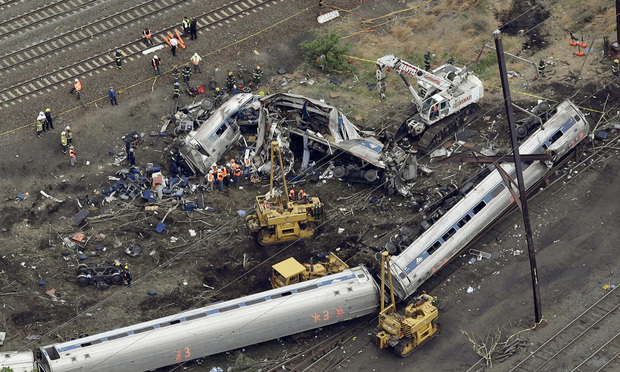Amtrak Engineer Again Escapes Charges Over Fatal 2015 Derailment
The second round of charges against Brandon Bostian were dropped Tuesday when Court of Common Pleas Judge Barbara McDermott granted his motion for habeas corpus.
July 23, 2019 at 05:39 PM
5 minute read
 Emergency personnel work at the scene of a night derailment May 13, 2015, in Philadelphia of an Amtrak train headed to New York. (AP Photo/Patrick Semansky, File)
Emergency personnel work at the scene of a night derailment May 13, 2015, in Philadelphia of an Amtrak train headed to New York. (AP Photo/Patrick Semansky, File)
For the second time, the Amtrak train engineer involved in the fatal derailment in Philadelphia in 2015 has avoided prosecution.
The second round of charges against Brandon Bostian were dropped Tuesday when Court of Common Pleas Judge Barbara McDermott granted his motion for habeas corpus.
A spokesperson for Attorney General's Office said it will appeal the decision.
Brian McMonagle, who represents Bostian, said Tuesday, “A good man and a fine engineer made an honest mistake while driving his train through an active crime scene where criminals were throwing rocks through the windshields of passenger trains. The idea of prosecuting the engineer is an obscenity.”
He continued, “The Philadelphia District Attorney's Office, the Justice Department, the National Transportation Board and now two judges have concluded that this was an accident and not a crime. I have great respect for the Attorney General's Office but the time has come for them to call the civil attorneys who started this prosecution and tell them that they were wrong to do so.”
On May 10, 2017, Thomas Kline and Robert Mongeluzzi, the Philadelphia plaintiffs attorneys who handled the civil litigation related to the derailment, along with prominent Philadelphia attorney Richard Sprague, filed two private criminal complaints on behalf of the victims' families. Those complaints were filed the day after the Philadelphia District Attorney's Office announced it would not file criminal charges against Bostian after an investigation by the office's homicide unit determined there was “no evidence that the engineer acted with criminal 'intent' or criminal 'knowledge' within the special meaning of those terms under Pennsylvania law for purposes of criminal charges.”
“Nor do we believe there is sufficient evidence to prove, beyond a reasonable doubt, criminal recklessness, which would be the only other basis for criminal liability,” the District Attorney's Office said at the time.
The day after the private criminal complaints were filed, the District Attorney's Office again declined to bring charges and the decision was immediately appealed to the Philadelphia Municipal Court.
Following a hearing later that day, Municipal Court President Judge Marsha Neifield ordered the District Attorney's Office to bring charges.
The District Attorney's Office responded to the order by referring the case to the state Attorney General's Office, which filed charges against Bostian on May 12, 2017.
On Sept. 12, 2017, Philadelphia Municipal Court Judge Thomas Gehret dismissed the charges against Bostian, ruling that there wasn't enough evidence to show a crime had been committed. But those charges were reinstated in February 2018 when Philadelphia Court of Common Pleas Judge Kathryn Streeter Lewis overturned Gehret's ruling.
On Tuesday, according to the docket in the case, McDermott granted Bostian's motion to reconsider Lewis' ruling and dismissed all charges.
In response to Tuesday's developments, Kline and Mongeluzzi issued a joint statement:
“We disagree with the ruling today and we disagree with Mr. McMonagle. This case was rightfully and independently pursued by the Pennsylvania Office of Attorney General, including the felony charge of risking a catastrophe, which was not brought originally by anyone other than the Attorney General,” they said. “Our clients are hopeful that the ruling will be reversed on appeal, and that ultimately there will be public accountability of Mr. Bostian, whose negligence caused the death of eight individuals and mayhem to the lives of hundreds of others.”
In February 2016, the National Transportation Safety Board released 2,000 pages of documents on the May 12, 2015, derailment, some of which detailed agency interviews with Bostian, who went around a curve doing twice the speed limit.
In a May 2015 interview, Bostian said his memory was blank after passing train platforms in North Philadelphia after leaving 30th Street Station—the next thing he remembered was coming to in the cab of the train after the accident. In a November 2015 interview, he recalled that he “may have” accelerated to 80 mph coming up to the curve where the train derailed in the Port Richmond section of the city—although he said he wasn't sure whether that was on the night of the accident—stating, “I remember feeling as though I was going too fast around the curve.”
The derailment resulted in a federal lawsuit against Amtrak, with the rail carrier admitting liability and ultimately agreeing to a $265 million settlement.
U.S. District Judge Legrome Davis of the Eastern District of Pennsylvania approved the settlement in the Amtrak multidistrict litigation Oct. 27, 2016, which reflected the “present value” of the federally capped $295 million damages limit Amtrak can be liable for.
This content has been archived. It is available through our partners, LexisNexis® and Bloomberg Law.
To view this content, please continue to their sites.
Not a Lexis Subscriber?
Subscribe Now
Not a Bloomberg Law Subscriber?
Subscribe Now
NOT FOR REPRINT
© 2025 ALM Global, LLC, All Rights Reserved. Request academic re-use from www.copyright.com. All other uses, submit a request to [email protected]. For more information visit Asset & Logo Licensing.
You Might Like
View All
People in the News—Feb. 3, 2025—Antheil Maslow, Kang Haggerty, Saxton & Stump
3 minute read

Pennsylvania Law Schools Are Seeing Double-Digit Boosts in 2025 Applications
5 minute readTrending Stories
- 1New York Judge Steps Down After Conviction for Intoxicated Driving
- 2Keys to Maximizing Efficiency (and Vibes) When Navigating International Trade Compliance Crosschecks
- 3Houston Law Firm Files $250K Breach of Contract Suit Against 2 Former Lawyers
- 4The Week in Data Feb. 3: A Look at Legal Industry Trends by the Numbers
- 5Mass Tort Cases: Challenges for Plaintiff’s and Defense Counsel
Who Got The Work
J. Brugh Lower of Gibbons has entered an appearance for industrial equipment supplier Devco Corporation in a pending trademark infringement lawsuit. The suit, accusing the defendant of selling knock-off Graco products, was filed Dec. 18 in New Jersey District Court by Rivkin Radler on behalf of Graco Inc. and Graco Minnesota. The case, assigned to U.S. District Judge Zahid N. Quraishi, is 3:24-cv-11294, Graco Inc. et al v. Devco Corporation.
Who Got The Work
Rebecca Maller-Stein and Kent A. Yalowitz of Arnold & Porter Kaye Scholer have entered their appearances for Hanaco Venture Capital and its executives, Lior Prosor and David Frankel, in a pending securities lawsuit. The action, filed on Dec. 24 in New York Southern District Court by Zell, Aron & Co. on behalf of Goldeneye Advisors, accuses the defendants of negligently and fraudulently managing the plaintiff's $1 million investment. The case, assigned to U.S. District Judge Vernon S. Broderick, is 1:24-cv-09918, Goldeneye Advisors, LLC v. Hanaco Venture Capital, Ltd. et al.
Who Got The Work
Attorneys from A&O Shearman has stepped in as defense counsel for Toronto-Dominion Bank and other defendants in a pending securities class action. The suit, filed Dec. 11 in New York Southern District Court by Bleichmar Fonti & Auld, accuses the defendants of concealing the bank's 'pervasive' deficiencies in regards to its compliance with the Bank Secrecy Act and the quality of its anti-money laundering controls. The case, assigned to U.S. District Judge Arun Subramanian, is 1:24-cv-09445, Gonzalez v. The Toronto-Dominion Bank et al.
Who Got The Work
Crown Castle International, a Pennsylvania company providing shared communications infrastructure, has turned to Luke D. Wolf of Gordon Rees Scully Mansukhani to fend off a pending breach-of-contract lawsuit. The court action, filed Nov. 25 in Michigan Eastern District Court by Hooper Hathaway PC on behalf of The Town Residences LLC, accuses Crown Castle of failing to transfer approximately $30,000 in utility payments from T-Mobile in breach of a roof-top lease and assignment agreement. The case, assigned to U.S. District Judge Susan K. Declercq, is 2:24-cv-13131, The Town Residences LLC v. T-Mobile US, Inc. et al.
Who Got The Work
Wilfred P. Coronato and Daniel M. Schwartz of McCarter & English have stepped in as defense counsel to Electrolux Home Products Inc. in a pending product liability lawsuit. The court action, filed Nov. 26 in New York Eastern District Court by Poulos Lopiccolo PC and Nagel Rice LLP on behalf of David Stern, alleges that the defendant's refrigerators’ drawers and shelving repeatedly break and fall apart within months after purchase. The case, assigned to U.S. District Judge Joan M. Azrack, is 2:24-cv-08204, Stern v. Electrolux Home Products, Inc.
Featured Firms
Law Offices of Gary Martin Hays & Associates, P.C.
(470) 294-1674
Law Offices of Mark E. Salomone
(857) 444-6468
Smith & Hassler
(713) 739-1250






